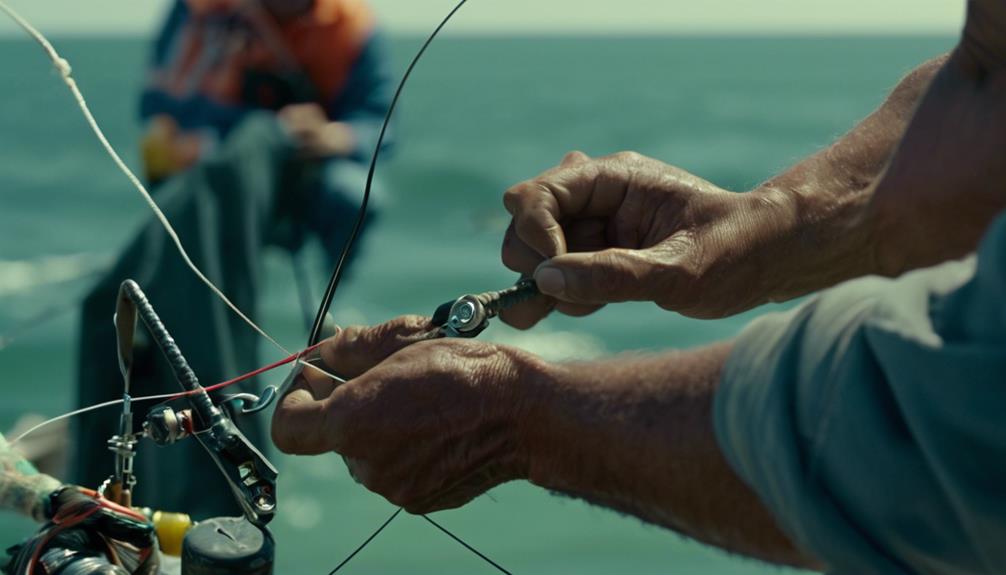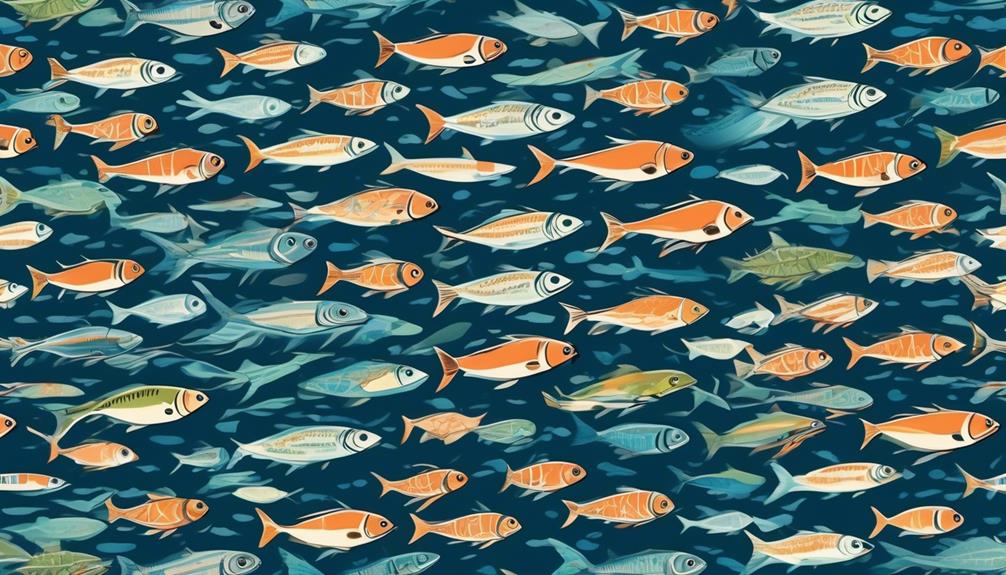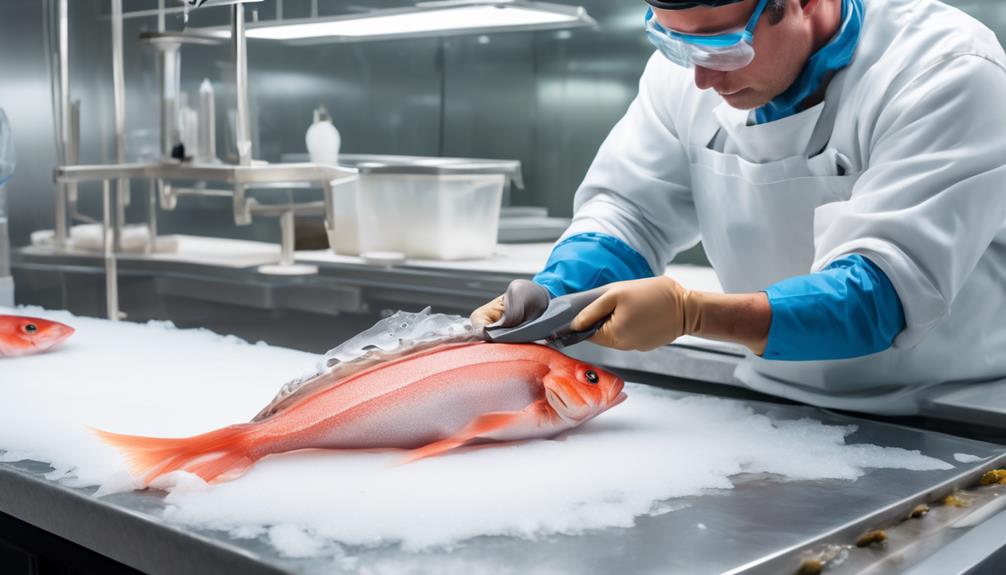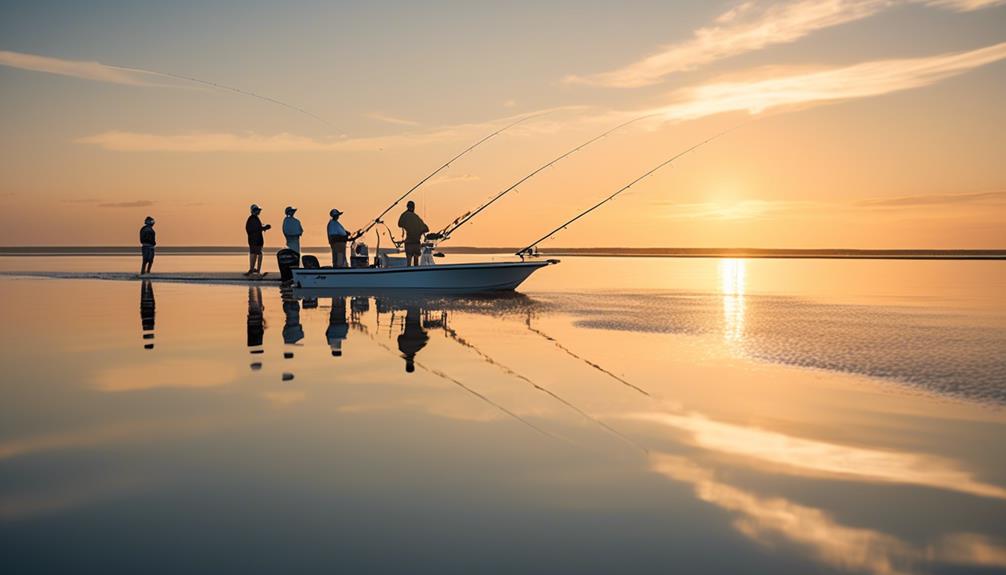So, you've decided to test your skills and compete in a saltwater fishing tournament. As you stand on the dock, watching the sun rise over the horizon, you feel the anticipation of the day ahead.
But before you cast your line and set out to conquer the seas, there are crucial factors to consider that can make or break your tournament experience.
From selecting the right gear to understanding tournament etiquette, mastering the art of saltwater fishing tournaments requires more than just luck and a love for the sport.
You need to arm yourself with the knowledge and preparation that will set you apart from the competition, and ultimately lead you to success.
Understanding Saltwater Fishing Tournaments
Participating in saltwater fishing tournaments involves navigating a blend of skills and strategies to compete successfully in the challenging marine environment. Understanding tournament dynamics is crucial to thriving in this competitive sport. The competitive spirit runs high as anglers vie for the most impressive catches and the top spots in the rankings.
Tournament dynamics encompass a variety of factors that can greatly influence your success in saltwater fishing competitions. Understanding the rules, regulations, and scoring systems is essential. It's not just about reeling in the biggest fish; it's about adhering to the guidelines set by the tournament organizers. Additionally, being aware of the different strategies employed by fellow competitors can give you a competitive edge. Observing how others approach the challenges of the marine environment can help you fine-tune your own techniques and increase your chances of success.
The competitive spirit in saltwater fishing tournaments is electrifying. There's an undeniable rush that comes with pitting your skills against other seasoned anglers. The desire to outperform your peers and claim the coveted title is what drives the competitive spirit in these events. It's not just about the thrill of the catch; it's about the thrill of triumphing over others in a test of skill and strategy. Embracing this competitive spirit can push you to continuously improve and adapt, making you a formidable contender in the world of saltwater fishing tournaments.
Selecting the Right Gear and Tackle
When selecting the right gear and tackle for saltwater fishing tournaments, consider the specific requirements and conditions of the marine environment to optimize your chances of success.
Saltwater fishing tournaments often require specialized gear due to the larger and more powerful fish found in these waters. Start by ensuring that your gear is properly maintained. Saltwater can be harsh on equipment, so it's crucial to regularly clean and lubricate your reels, rods, and other gear to prevent corrosion and damage.
Additionally, organizing your tackle is essential for efficiency during the tournament. Use tackle boxes with dividers to keep your lures, hooks, and weights neatly organized and easily accessible. This will save you time and frustration when you need to quickly change your rig or bait.
When selecting your gear, consider the species of fish you'll be targeting and the techniques you'll be using. For example, if you're aiming for larger game fish like marlin or tuna, you'll need heavy-duty rods and reels capable of handling the power of these creatures. On the other hand, if you're going after smaller fish such as snapper or mackerel, lighter gear may be more appropriate.
Research the specific requirements of the tournament and the local marine conditions to ensure that you have the right gear for the job. By maintaining your gear and organizing your tackle effectively, you'll be better prepared to tackle the challenges of a saltwater fishing tournament.
Identifying Target Species and Regulations
To optimize your chances of success in saltwater fishing tournaments, it's essential to first identify the target species and familiarize yourself with the specific regulations governing their capture. Identifying the fish you're targeting is crucial for planning your fishing strategy. Different species have varying catch limits and size regulations, so it's important to know the specific rules for each type of fish. By understanding the regulations, you can ensure that you're in compliance with conservation efforts and local fishing laws.
Catch limits are put in place to protect fish populations and ensure sustainable fishing practices. It's imperative to be aware of these limits to avoid overfishing and contribute to conservation efforts. Additionally, size regulations dictate the minimum and maximum sizes at which fish can be legally caught. This helps preserve the breeding stock and allows fish to reach maturity before being harvested.
Before participating in a saltwater fishing tournament, take the time to research and understand the regulations for the target species in the tournament area. This includes familiarizing yourself with catch limits, size regulations, and any other specific rules that may apply. By adhering to these regulations, you not only demonstrate respect for the environment and conservation efforts but also avoid potential penalties for non-compliance.
Ultimately, being knowledgeable about target species and regulations will contribute to a more successful and responsible fishing experience in saltwater tournaments.
Mastering Saltwater Fishing Techniques
Improving your saltwater fishing techniques requires mastering the art of casting, reeling, and maneuvering your bait or lure in challenging marine environments.
When it comes to casting techniques, it's essential to practice different casting styles to adapt to changing wind conditions and reach distant feeding grounds. Experiment with overhead casts, sidearm casts, and pitches to increase your accuracy and distance.
Additionally, understanding bait selection is crucial. Different species of fish are attracted to different types of bait, so it's important to research and experiment with various bait options to maximize your chances of a successful catch.
In saltwater environments, tides and currents play a significant role in fish behavior. Learning to read these natural patterns and understanding how they affect fish movement is vital. Fish are often more active during tidal changes, so timing your fishing outings with incoming or outgoing tides can significantly improve your chances of success.
Additionally, currents can affect the movement of your bait or lure, so being mindful of these underwater forces and adjusting your fishing techniques accordingly is key.
Mastering saltwater fishing techniques isn't just about strength; it's about finesse and strategy. By honing your casting techniques, understanding bait selection, and factoring in tides and currents, you can greatly enhance your saltwater fishing skills and increase your chances of a rewarding catch in the challenging marine environment.
Strategizing for Tournament Success
Strategize for tournament success by carefully analyzing the competition and tailoring your approach to the specific conditions of the fishing event. Understanding your competition is crucial. Research their strengths and weaknesses, and identify potential strategies to outperform them. Additionally, consider team dynamics if you're part of a team. Effective communication, trust, and a clear division of tasks can significantly improve your chances of success.
Competition analysis isn't limited to your opponents; it also involves understanding the fishing conditions. Assess factors such as water temperature, depth, and clarity, as well as the behavior of the fish in those conditions. This will help you determine the most suitable fishing techniques and equipment to use during the tournament.
Time management is key. Plan your fishing time wisely, considering factors such as the movement of the fish and the tournament schedule. Allocate enough time to travel to various fishing spots and adapt your strategy based on the time of day.
Weather conditions can greatly impact fishing. Keep a close eye on the weather forecast leading up to the tournament. Wind, rain, and temperature changes can influence fish behavior and movement. Prepare alternative strategies based on the expected weather conditions to ensure that you're ready for any scenario during the tournament.
Navigating Tournament Etiquette and Rules
Understanding the etiquette and rules of the tournament is essential for maximizing your chances of success and ensuring a fair and enjoyable experience for all participants. Sportsmanship and fair play are the cornerstones of any saltwater fishing tournament. It's crucial to uphold these values throughout the competition to maintain a positive atmosphere and camaraderie among fellow anglers.
Tournament conduct and sports etiquette dictate that you should always treat other participants with respect, whether they're your competitors or not. This means avoiding disruptive behavior, showing consideration for others on the water, and adhering to the tournament's rules and regulations at all times.
When it comes to fair play, it's important to understand the specific rules and guidelines of the tournament. Familiarize yourself with the scoring system, size and bag limits, as well as any restricted areas for fishing. Adhering to these rules not only ensures a level playing field for all participants but also contributes to the conservation of fish populations and their habitats.
Additionally, practicing good sportsmanship involves being honest and transparent in your reporting and adherence to the rules. Any breaches of the rules not only tarnish your own integrity but also impact the overall integrity of the tournament.
Preparing for the Tournament Day
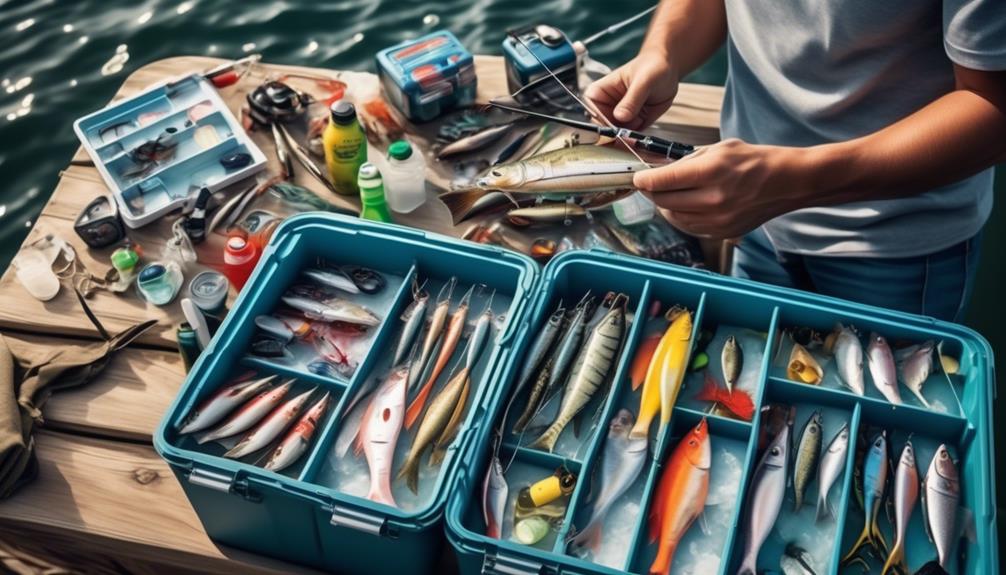
To make the most of your tournament day, it's essential to ensure that you have all the necessary gear and supplies ready and organized well in advance. Final preparations are crucial for both your mental and physical readiness. Here's what you need to focus on:
- Gear and Tackle: Double-check that you have all the fishing gear and tackle you'll need for the tournament day. This includes rods, reels, lines, lures, bait, and any special equipment required by the tournament rules. Ensure that everything is in good working condition, and consider packing extras of essential items in case of loss or damage during the competition.
- Food and Hydration: Don't forget to pack enough food and water to keep you energized and hydrated throughout the day. High-energy, non-perishable snacks like nuts, granola bars, and dried fruits are ideal. Additionally, bring sufficient water to keep yourself hydrated, as staying focused and alert is crucial for a successful fishing day.
- Mental Preparation: Take some time to mentally prepare yourself for the tournament. Visualize yourself having a successful day on the water, and go over your fishing strategies and techniques. Stay positive and confident, as having the right mindset can significantly impact your performance on tournament day.
Making the Most of the Tournament Experience
Maximize your tournament experience by establishing a positive rapport with fellow anglers and learning from their techniques and insights. Saltwater fishing tournaments provide excellent networking opportunities where you can bond with fellow anglers who share your passion.
Strike up conversations during breaks or at the post-tournament gatherings. Building connections can lead to lasting friendships and valuable knowledge exchange. Share your own experiences and be open to learning from others. You might pick up new tips, tricks, and strategies that could enhance your future fishing endeavors.
Additionally, don't forget to capture memories and document your tournament experience. Take plenty of photos of the scenic views, the fish you catch, and the moments shared with your fellow anglers. These photos can serve as wonderful mementos and reminders of the fun times you'd during the tournament.
Consider creating a scrapbook or digital album to preserve these memories for years to come. You can also write a journal entry detailing the highlights of the tournament, including any interesting anecdotes or lessons learned.
Frequently Asked Questions
What Are Some Common Strategies for Finding the Best Fishing Spots During a Saltwater Fishing Tournament?
To find the best fishing spots during a saltwater tournament, consider tidal patterns and use GPS technology. Also, pay attention to bait selection and weather conditions. These strategies will help you locate the prime fishing spots.
Are There Any Unwritten Rules or Customs That Participants Should Be Aware of When Interacting With Other Anglers During a Tournament?
When at a saltwater fishing tournament, be mindful of unwritten rules and social etiquette. Respect other anglers by maintaining good sportsmanship and positive interaction. Follow common courtesy, such as giving space and sharing information.
How Can I Properly Handle and Release Fish That I Catch During the Tournament to Ensure Their Survival?
When handling fish during the tournament, it's important to use proper techniques for their release. Ensure fish survival by practicing conservation. Use gentle handling, avoid prolonged air exposure, and release the fish in a manner that maximizes its chance of survival.
What Are Some Tips for Staying Focused and Maintaining a Positive Mindset Throughout the Duration of a Saltwater Fishing Tournament?
To stay motivated and maintain mental toughness during a saltwater fishing tournament, focus under pressure and use positive self-talk. Visualize success, set small goals, and celebrate achievements. Keep a clear mind, stay present, and remember to enjoy the experience.
Are There Any Specific Techniques or Tactics That Are Particularly Effective for Catching Certain Species of Saltwater Fish in Tournament Conditions?
To catch specific saltwater fish in tournament conditions, focus on effective baiting and use trolling techniques. These tactics can help you target the species you're aiming for and increase your chances of success during the competition.
Conclusion
So, now you're ready to dive into the world of saltwater fishing tournaments. With the right gear, knowledge of regulations, and solid fishing techniques, you'll be well-prepared for success.
Remember to strategize, follow tournament etiquette, and make the most of the experience. With a little preparation and a lot of determination, you'll be ready to reel in the big catch and make the most of your tournament experience.
Good luck out on the water!
